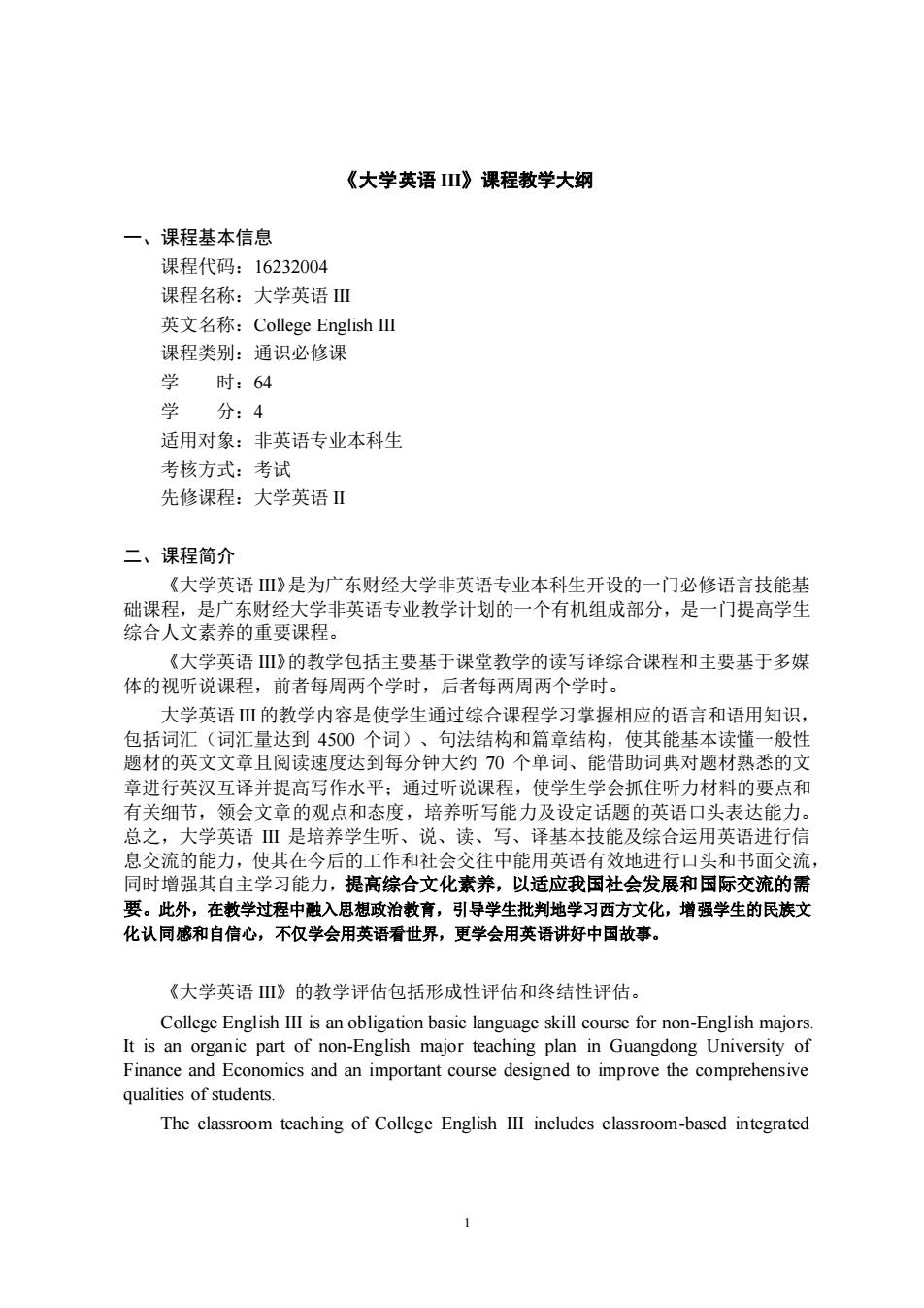
《大学英语Ⅲ》课程教学大纲 一、课程基本信息 课程代码:16232004 课程名称:大学英语Ⅲ 英文名称:College EnglishⅢ 课程类别:通识必修课 学时:64 学分:4 适用对象:非英语专业本科生 考核方式:考试 先修课程:大学英语Ⅱ 二、课程简介 《大学英语Ⅲ》是为广东财经大学非英语专业本科生开设的一门必修语言技能基 础课程,是广东财经大学非英语专业教学计划的一个有机组成部分,是一门提高学生 综合人文素养的重要课程。 《大学英语Ⅲ》的教学包括主要基于课堂教学的读写译综合课程和主要基于多媒 体的视听说课程,前者每周两个学时,后者每两周两个学时。 大学英语Ⅲ的教学内容是使学生通过综合课程学习掌握相应的语言和语用知识 包括词汇 (词汇 达到4500 词) 句法结构和 章结构,使其能基 “性 题材的英文文章且阅读速度达到每分钟大约70个单词、能借助词典对题材熟悉的文 章进行英汉互译并提高写作水平:通过听说课程,使学生学会抓住听力材料的要点和 有关细节,领会文章的观点和态度,培养听写能力及设定话题的英语口头表达能力。 总之,大学英语Ⅲ是培养学生听、说、读、写、译基本技能及综合运用英语进行信 息交流的 甘 >后的工作和社会交往 能用 地进 和书面交 同时增强其自主学习能力,提高综合文化素养,以适应我国社会发展和国际交流的需 要。此外,在教学过程中融入思想政治教育,引导学生批判地学习西方文化,增强学生的民族文 化认同感和自信心,不仅学会用英语看世界,更学会用英语讲好中国故事。 《大学英语Ⅲ》的教学评估包括形成性评估和终结性评估 College English III is an obligation basic language skill course for non-English majors. It is an organic part of non-English major teaching plan in Guangdong University of omics and an importaint course designed to mprove the comprelensive Financ The classroom teaching of College English III includes classroom-based integrated 1
1 《大学英语 III》课程教学大纲 一、课程基本信息 课程代码:16232004 课程名称:大学英语 III 英文名称:College English III 课程类别:通识必修课 学 时:64 学 分:4 适用对象:非英语专业本科生 考核方式:考试 先修课程:大学英语 II 二、课程简介 《大学英语 III》是为广东财经大学非英语专业本科生开设的一门必修语言技能基 础课程,是广东财经大学非英语专业教学计划的一个有机组成部分,是一门提高学生 综合人文素养的重要课程。 《大学英语 III》的教学包括主要基于课堂教学的读写译综合课程和主要基于多媒 体的视听说课程,前者每周两个学时,后者每两周两个学时。 大学英语 III 的教学内容是使学生通过综合课程学习掌握相应的语言和语用知识, 包括词汇(词汇量达到 4500 个词)、句法结构和篇章结构,使其能基本读懂一般性 题材的英文文章且阅读速度达到每分钟大约 70 个单词、能借助词典对题材熟悉的文 章进行英汉互译并提高写作水平;通过听说课程,使学生学会抓住听力材料的要点和 有关细节,领会文章的观点和态度,培养听写能力及设定话题的英语口头表达能力。 总之,大学英语 III 是培养学生听、说、读、写、译基本技能及综合运用英语进行信 息交流的能力,使其在今后的工作和社会交往中能用英语有效地进行口头和书面交流, 同时增强其自主学习能力,提高综合文化素养,以适应我国社会发展和国际交流的需 要。此外,在教学过程中融入思想政治教育,引导学生批判地学习西方文化,增强学生的民族文 化认同感和自信心,不仅学会用英语看世界,更学会用英语讲好中国故事。 《大学英语 III》的教学评估包括形成性评估和终结性评估。 College English III is an obligation basic language skill course for non-English majors. It is an organic part of non-English major teaching plan in Guangdong University of Finance and Economics and an important course designed to improve the comprehensive qualities of students. The classroom teaching of College English III includes classroom-based integrated
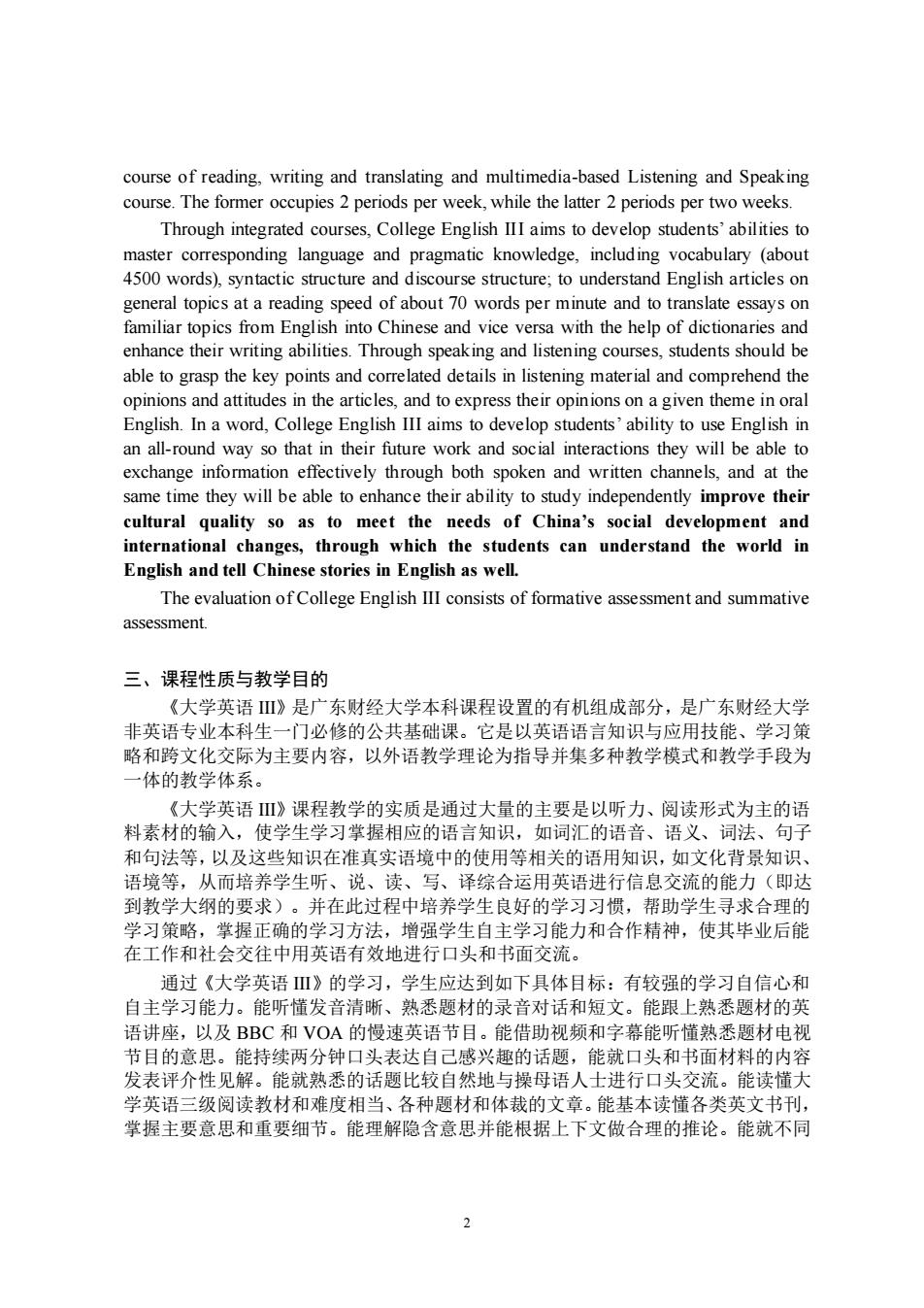
course of reading.writing and translating and multimedia-based Listening and Speaking course.The former occupies 2 periods per week,while the latter 2 periods per two weeks. Through integrated courses.College English IIIaims to develop studentsabilities to master corresponding language and pragmatic knowledge,including vocabulary (about 4500 words),syntactic structure and discourse structure;to understand English articles on general topics at a reading speed of about 70 words per minute and to translate essays on familiar t topics from En nto Chinese and vice sa with the help of dictiona ies and enhance their writing abilities.Through speaking and listening courses, students should b able to grasp the key points and correlated details in listening material and comprehend the opinions and attitudes in the articles,and to express their opinions on a given theme in oral English.In a word,College English III aims to develop students'ability to use English in an all-round way so that in their future work and social interactions they will be able to exchange effectively throu th an writter at the same time they will be able to enhance their ability to study independently improve their cultural quality so as to meet the needs of China's social development and international changes,through which the students can understand the world in English and tell Chinese stories in English as well. The evaluation of College English III consists of formative assessment and summative assessment 三、课程性质与教学目的 《大学英语Ⅲ》是广东财经大学本科课程设置的有机组成部分 ,是广东财经大学 非英语专业本科生一门必修的公共基础课。它是以英语语言知识与应用技能、学习策 略和跨文化交际为主要内容,以外语教学理论为指导并集多种教学模式和教学手段为 体的教学体系。 《大学英语》课程教学的实质是通过大量的主要是以听力、阅读形式为主的语 料素材的输入,使学生学习掌握相应的语言知识,如词汇的语音、语义、词法、句子 和句法等,以及这些知识在准真实语境中的使用等相关的语用知识,如文化背景知识 语境等,从而培养学生听、说、读、写、译综合运用英语进行信息交流的能力(即达 到教学大纲的要求 并在此过程中培 良好的学习习惯 求合理的 学习策略,掌握正确的学习方法,增强学生自主学习能力和合作精神,使其毕业后能 在工作和社会交往中用英语有效地进行口头和书面交流。 通过《大学英语Ⅲ》的学习,学生应达到如下具体目标:有较强的学习自信心和 自主学习能力。能听懂发音清晰、熟悉题材的录音对话和短文。能跟上熟悉题材的英 语讲座,以及BBC和VOA的慢速英语节目。能借助视频和字幕能听懂熟悉题材电视 节目的意思。能持续两分钟口头表达自己感兴趣的话题,能就口头和书面材料的内容 发表评介性见解。能就熟悉的话题比较自然地与操母语人士进行口头交流。能读懂大 学英语三级阅读教材和难度相当、各种题材和体裁的文章。能基本读懂各类英文书刊 掌握主要意思和重要细节。能理解隐含意思并能根据上下文做合理的推论。能就不同 2
2 course of reading, writing and translating and multimedia-based Listening and Speaking course. The former occupies 2 periods per week, while the latter 2 periods per two weeks. Through integrated courses, College English III aims to develop students’ abilities to master corresponding language and pragmatic knowledge, including vocabulary (about 4500 words), syntactic structure and discourse structure; to understand English articles on general topics at a reading speed of about 70 words per minute and to translate essays on familiar topics from English into Chinese and vice versa with the help of dictionaries and enhance their writing abilities. Through speaking and listening courses, students should be able to grasp the key points and correlated details in listening material and comprehend the opinions and attitudes in the articles, and to express their opinions on a given theme in oral English. In a word, College English III aims to develop students’ ability to use English in an all-round way so that in their future work and social interactions they will be able to exchange information effectively through both spoken and written channels, and at the same time they will be able to enhance their ability to study independently improve their cultural quality so as to meet the needs of China’s social development and international changes, through which the students can understand the world in English and tell Chinese stories in English as well. The evaluation of College English III consists of formative assessment and summative assessment. 三、课程性质与教学目的 《大学英语 III》是广东财经大学本科课程设置的有机组成部分,是广东财经大学 非英语专业本科生一门必修的公共基础课。它是以英语语言知识与应用技能、学习策 略和跨文化交际为主要内容,以外语教学理论为指导并集多种教学模式和教学手段为 一体的教学体系。 《大学英语 III》课程教学的实质是通过大量的主要是以听力、阅读形式为主的语 料素材的输入,使学生学习掌握相应的语言知识,如词汇的语音、语义、词法、句子 和句法等,以及这些知识在准真实语境中的使用等相关的语用知识,如文化背景知识、 语境等,从而培养学生听、说、读、写、译综合运用英语进行信息交流的能力(即达 到教学大纲的要求)。并在此过程中培养学生良好的学习习惯,帮助学生寻求合理的 学习策略,掌握正确的学习方法,增强学生自主学习能力和合作精神,使其毕业后能 在工作和社会交往中用英语有效地进行口头和书面交流。 通过《大学英语 III》的学习,学生应达到如下具体目标:有较强的学习自信心和 自主学习能力。能听懂发音清晰、熟悉题材的录音对话和短文。能跟上熟悉题材的英 语讲座,以及 BBC 和 VOA 的慢速英语节目。能借助视频和字幕能听懂熟悉题材电视 节目的意思。能持续两分钟口头表达自己感兴趣的话题,能就口头和书面材料的内容 发表评介性见解。能就熟悉的话题比较自然地与操母语人士进行口头交流。能读懂大 学英语三级阅读教材和难度相当、各种题材和体裁的文章。能基本读懂各类英文书刊, 掌握主要意思和重要细节。能理解隐含意思并能根据上下文做合理的推论。能就不同
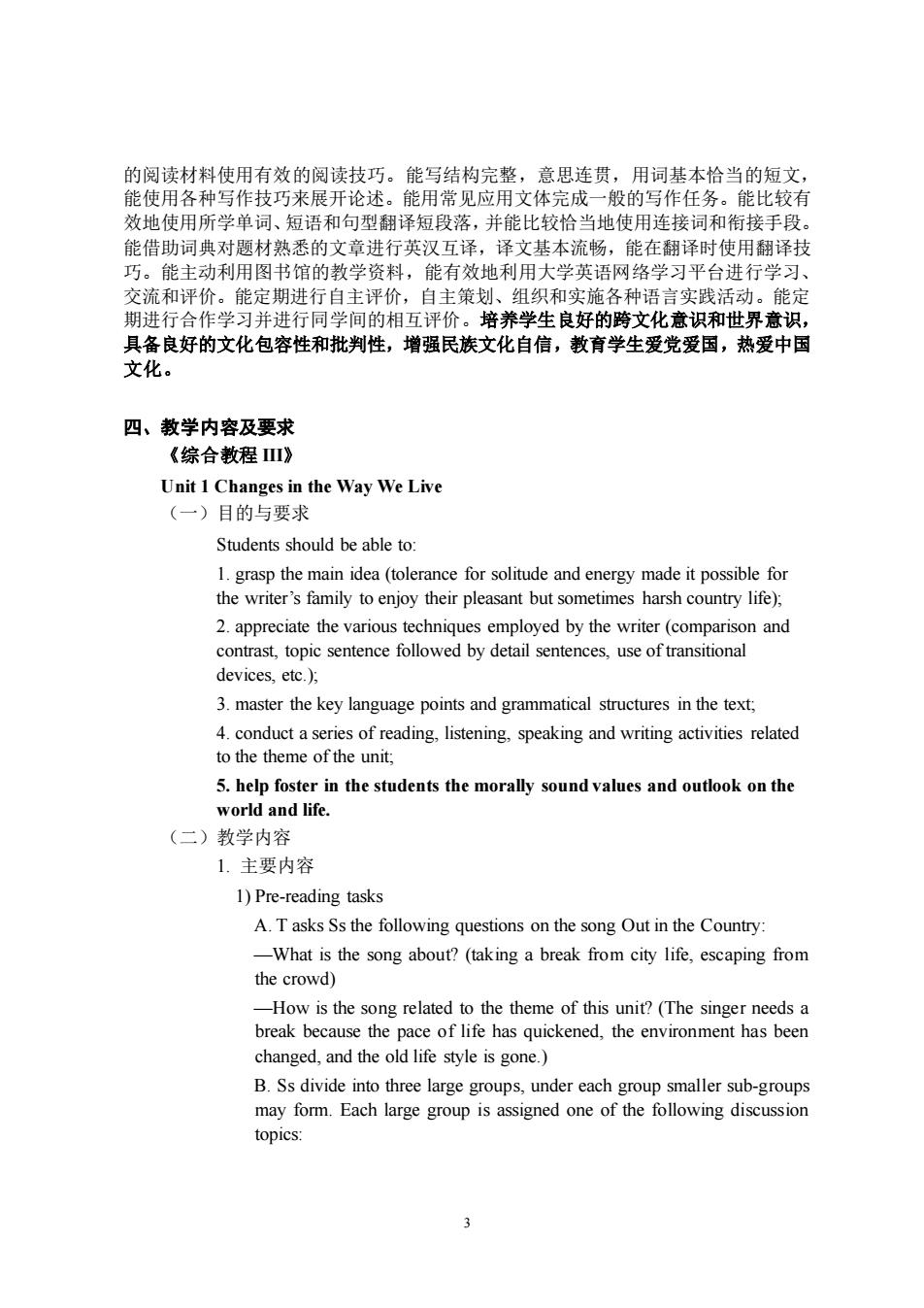
的阅读材料使用有效的阅读技巧。能写结构完整,意思连贯,用词基本恰当的短文 能使用各种写作技巧来展开论述。能用常见应用文体完成一般的写作任务。能比较有 效地使用所学单词、短语和句型翻译短段落,并能比较恰当地使用连接词和衔接手段。 能借助词曲对顺材锁采的音讲行革汉互译,泽文基本流场,能在翻泽时使田翻泽枝 能主动利用图书馆的教学资料 能有效地利用大学英语网络学习平台进行学习 交流和评价。能定期进行自主评价,自主策划、组织和实施各种语言实践活动。能定 期进行合作学习并进行同学间的相互评价。培养学生良好的跨文化意识和世界意识, 具备良好的文化包容性和批判性,增强民族文化自信,教育学生爱党爱国,热爱中国 文化。 四、教学内容及要求 《综合教程Ⅲ》 Unit 1 Changes in the Way We Live (一)目的与要求 Students should be able to: 1.grasp the main idea(tolerance for solitude and energy made it possible for the writer's family to enjoy their pleasant but sometimes harsh country life). 2.appreciate the various techniques employed by the writer (comparison and contrast,by detail sentences,use oftransitional devices.etc.) 3.master the key language points and grammatical structures in the text 4.conduct a series of reading,listening,speaking and writing activities related to the theme of the unit: 5.help foster in the students the morally sound values and outlook on the world and life. (二)教学内容 L.主要内容 1)Pre-reading tasks A.Tasks Ss the following questions on the song Out in the Country -What is the song about?(taking a break from city life,escaping from the crowd) -How is the song related to the theme of this unit?(The singer needs a break because the pace of life has quickened,the environment has been changed,and the old life style is gone.) B.Ss divide into three large groups,under each group smaller sub-groups may form.Each large group is assigned one of the following discussion topics: 3
3 的阅读材料使用有效的阅读技巧。能写结构完整,意思连贯,用词基本恰当的短文, 能使用各种写作技巧来展开论述。能用常见应用文体完成一般的写作任务。能比较有 效地使用所学单词、短语和句型翻译短段落,并能比较恰当地使用连接词和衔接手段。 能借助词典对题材熟悉的文章进行英汉互译,译文基本流畅,能在翻译时使用翻译技 巧。能主动利用图书馆的教学资料,能有效地利用大学英语网络学习平台进行学习、 交流和评价。能定期进行自主评价,自主策划、组织和实施各种语言实践活动。能定 期进行合作学习并进行同学间的相互评价。培养学生良好的跨文化意识和世界意识, 具备良好的文化包容性和批判性,增强民族文化自信,教育学生爱党爱国,热爱中国 文化。 四、教学内容及要求 《综合教程 III》 Unit 1 Changes in the Way We Live (一)目的与要求 Students should be able to: 1. grasp the main idea (tolerance for solitude and energy made it possible for the writer’s family to enjoy their pleasant but sometimes harsh country life); 2. appreciate the various techniques employed by the writer (comparison and contrast, topic sentence followed by detail sentences, use of transitional devices, etc.); 3. master the key language points and grammatical structures in the text; 4. conduct a series of reading, listening, speaking and writing activities related to the theme of the unit; 5. help foster in the students the morally sound values and outlook on the world and life. (二)教学内容 1. 主要内容 1) Pre-reading tasks A. T asks Ss the following questions on the song Out in the Country: —What is the song about? (taking a break from city life, escaping from the crowd) —How is the song related to the theme of this unit? (The singer needs a break because the pace of life has quickened, the environment has been changed, and the old life style is gone.) B. Ss divide into three large groups, under each group smaller sub-groups may form. Each large group is assigned one of the following discussion topics:
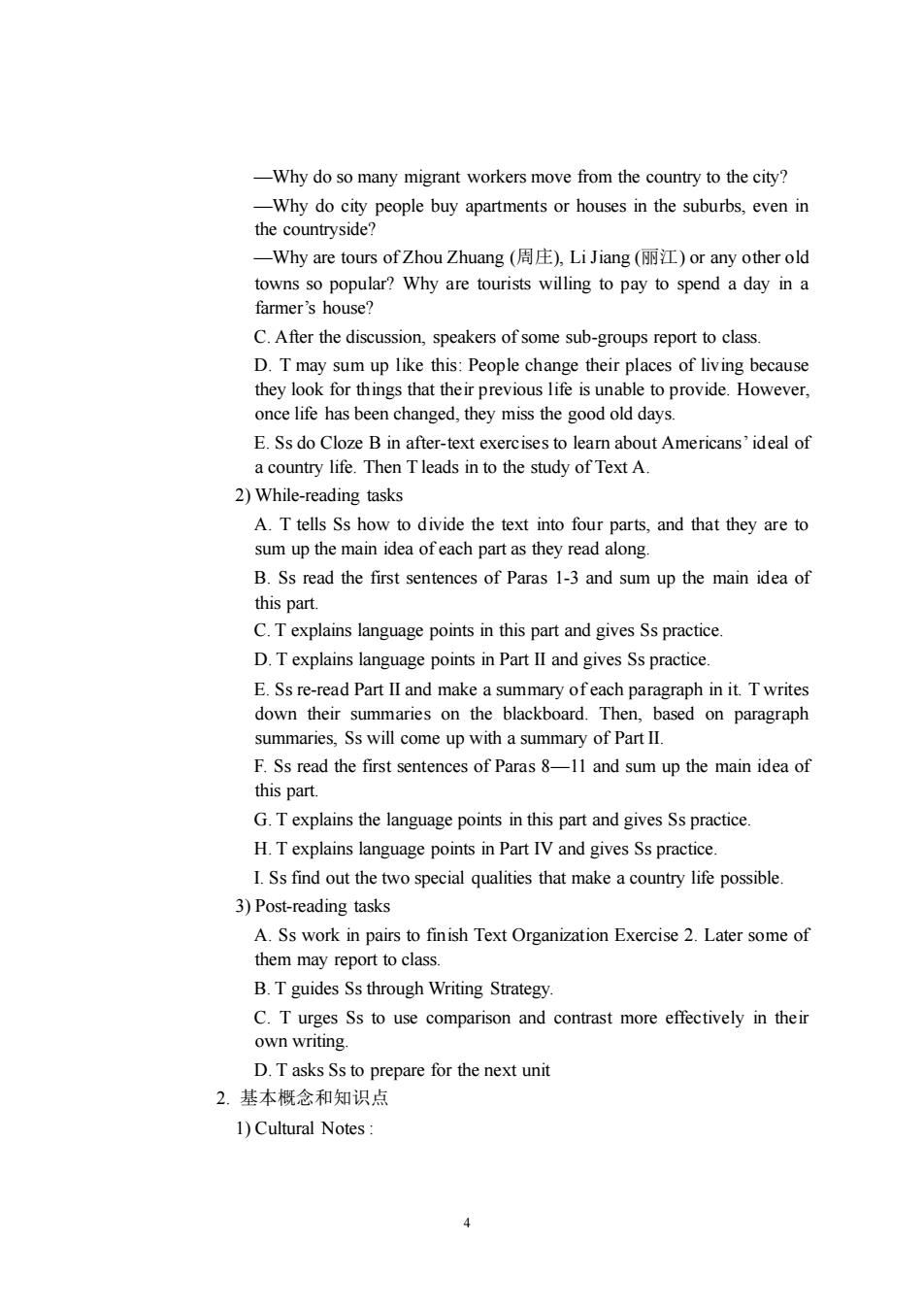
-Why do so many migrant workers move from the country to the city? -Why are tours of Zhou Zhuang(周庄),Li Jiang(丽江)or any other old towns so popular?Why are tourists willing to payto spend a day in a farmer's house? C.After the discussion,speakers of some sub-groups report to class. D.T may sum up like this:People change their places of living because they look for things that their previous life is unable to provide.However, once life has been changed,they miss the good old days. E.Ss do Cloze B in after-text exercises to learn about Americans'ideal of a country life.Then Tleads in to the study of Text A. 2)While-reading tasks A.T tells Ss how to divide the text into four parts,and that they are to sum up the main idea ofeach part as they read along B.Ss read the first sentences of Paras 1-3 and sum up the main idea of this part. C.T explains language points in this part and gives Ss practice. D.Texplains language points in Part II and gives Ss practice. E.Ss re-read Part II and make a summary ofeach paragraph in it.Twrites down their summaries on the blackboard.Then,based on paragraph summaries,Ss will come up with a summary of Part II. F.Ss read the first sentences of Paras 8-11 and sum up the main idea of this part. G.T explains the language points in this part and gives Ss practice. H.T explains language points in Part IV and gives Ss practice I.Ss find out the two special qualities that make a country life possible. 3)Post-reading tasks a.ss work in pairs to finish Text organization exercise 2.later some of them may report to class B.T guides Ss through Writing Strategy. C.T urges Ss to use comparison and contrast more effectively in their own writing. D.Tasks Ss to prepare for the next unit 2.基本概念和知识点 1)Cultural Notes
4 —Why do so many migrant workers move from the country to the city? —Why do city people buy apartments or houses in the suburbs, even in the countryside? —Why are tours of Zhou Zhuang (周庄), Li Jiang (丽江) or any other old towns so popular? Why are tourists willing to pay to spend a day in a farmer’s house? C. After the discussion, speakers of some sub-groups report to class. D. T may sum up like this: People change their places of living because they look for things that their previous life is unable to provide. However, once life has been changed, they miss the good old days. E. Ss do Cloze B in after-text exercises to learn about Americans’ ideal of a country life. Then T leads in to the study of Text A. 2) While-reading tasks A. T tells Ss how to divide the text into four parts, and that they are to sum up the main idea of each part as they read along. B. Ss read the first sentences of Paras 1-3 and sum up the main idea of this part. C. T explains language points in this part and gives Ss practice. D. T explains language points in Part II and gives Ss practice. E. Ss re-read Part II and make a summary of each paragraph in it. T writes down their summaries on the blackboard. Then, based on paragraph summaries, Ss will come up with a summary of Part II. F. Ss read the first sentences of Paras 8—11 and sum up the main idea of this part. G. T explains the language points in this part and gives Ss practice. H. T explains language points in Part IV and gives Ss practice. I. Ss find out the two special qualities that make a country life possible. 3) Post-reading tasks A. Ss work in pairs to finish Text Organization Exercise 2. Later some of them may report to class. B. T guides Ss through Writing Strategy. C. T urges Ss to use comparison and contrast more effectively in their own writing. D. T asks Ss to prepare for the next unit 2. 基本概念和知识点 1) Cultural Notes :
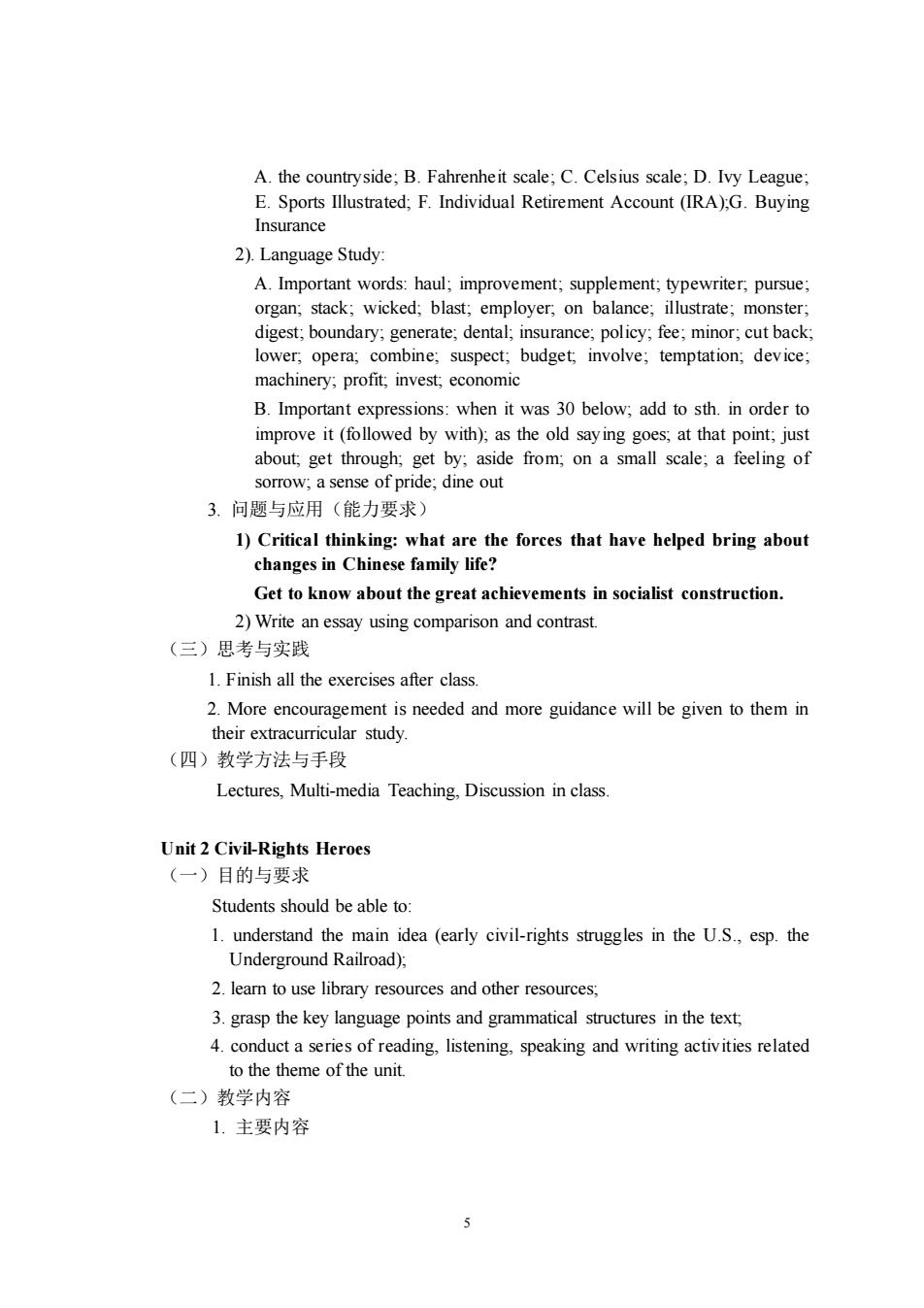
A.the countryside;B.Fahrenheit scale;C.Celsius scale;D.Ivy League; E.Sports Illustrated;F.Individual Retirement Account (IRA);G.Buying Insurance 2).Language Study: A.Important words:haul;improvement;supplement,typewriter,pursue organ;stack;wicked;blast;employer,on balance;illustrate;monster digest;boundary:generate:dental;insurance;policy;fee;minor;cut back; lower,opera;combine;suspect;budget,involve;temptation;device; machinery;profit;invest,economic B.Important expressions:when it was 30 below;add to sth.in order to improve it(followed by with);as the old saying goes:at that point;just about,get through;get by:aside from;on a small scale:a feeling of sense of pride:dine ou 3.问题与应用(能力要求) 1)Critical thinking:what are the forces that have helped bring about changes in Chinese family life? Get to know about the great achievements in socialist construction 2)Write an essay using comparison and contrast. (三)思考与实践 1.Finish all the exercises after class. 2.More encouragement is needed and more guidance will be given to them in their extracurricular study. (四)教学方法与手段 Lectures,Multi-media Teaching,Discussion in class Unit 2 Civil-Rights Heroes (一)目的与要求 Students should be able to: 1.understand the main idea (early civil-rights struggles in the U.S.,esp.the Underground Railroad). 2.learn to use library resources and other resources; 3.grasp the key language points and grammatical structures in the text 4.conduct a series of reading.listening.speaking and writing activities related to the theme of the unit. (二)教学内容 1.主要内容 5
5 A. the countryside; B. Fahrenheit scale; C. Celsius scale; D. Ivy League; E. Sports Illustrated; F. Individual Retirement Account (IRA);G. Buying Insurance 2). Language Study: A. Important words: haul; improvement; supplement; typewriter; pursue; organ; stack; wicked; blast; employer; on balance; illustrate; monster; digest; boundary; generate; dental; insurance; policy; fee; minor; cut back; lower; opera; combine; suspect; budget; involve; temptation; device; machinery; profit; invest; economic B. Important expressions: when it was 30 below; add to sth. in order to improve it (followed by with); as the old saying goes; at that point; just about; get through; get by; aside from; on a small scale; a feeling of sorrow; a sense of pride; dine out 3. 问题与应用(能力要求) 1) Critical thinking: what are the forces that have helped bring about changes in Chinese family life? Get to know about the great achievements in socialist construction. 2) Write an essay using comparison and contrast. (三)思考与实践 1. Finish all the exercises after class. 2. More encouragement is needed and more guidance will be given to them in their extracurricular study. (四)教学方法与手段 Lectures, Multi-media Teaching, Discussion in class. Unit 2 Civil-Rights Heroes (一)目的与要求 Students should be able to: 1. understand the main idea (early civil-rights struggles in the U.S., esp. the Underground Railroad); 2. learn to use library resources and other resources; 3. grasp the key language points and grammatical structures in the text; 4. conduct a series of reading, listening, speaking and writing activities related to the theme of the unit. (二)教学内容 1. 主要内容
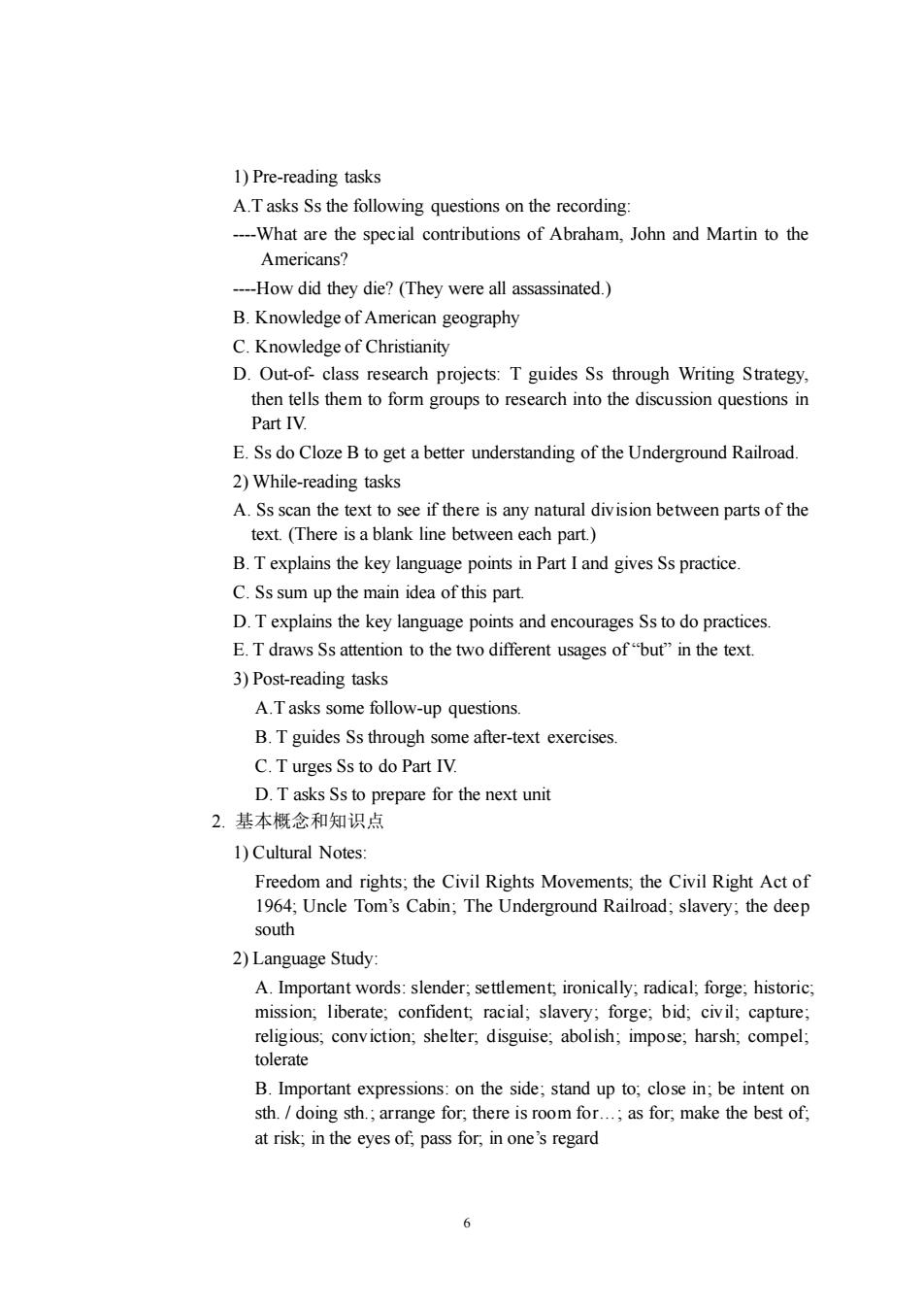
1)Pre-reading tasks A.Tasks Ss the following questions on the recording: ---What are the special contributions of Abraham,John and Martin to the Americans? ----How did they die?(They were all assassinated. B.Knowledge of American geography C.Knowledge of Christianity D.Out-of-class research projects:T guides Ss through Writing Strategy then tells them to form groups to research into the discussion questions in Part IV E.Ss do Cloze B to get a better understanding of the Underground Railroad 2)While-reading tasks A.Ss scan the text to see if there is any natural division between parts of the text.(There is a blank line between each part B.T explains the key language points in Part I and gives Ss practice. C.Ss sum up the main idea of this part D.T explains the key language points and encourages Ss to do practices. E.Tdraws Ss attention to the two different usages of"but"in the text. 3)Post-reading tasks A.Tasks some follow-up questions. B.Tguides Ss through some after-text exercises. C.T urges Ss to do Part IV. D.Tasks Ss to prepare for the next unit 2.基本概念和知识点 1)Cultural Notes: Freedom and Civil Rights Movements the Civil Right Act of Uncle Tom's Cabin;The Underground Railroad slavery;the deep south 2)Language Study A.Important words:slender;settlement,ironically;radical;forge:historic; mission;liberate;confident racial;slavery;forge;bid;civil;capture; religious,conviction,shelter,disguise,abolish;impose;harsh;compel; tolerate B.Important expressions:on the side;stand up to;close in;be intent on sth.doing sth.;arrange for,there is room for...;as for,make the best of; at risk:in the eyes of pass for,in one's regard 6
6 1) Pre-reading tasks A.T asks Ss the following questions on the recording: ----What are the special contributions of Abraham, John and Martin to the Americans? ----How did they die? (They were all assassinated.) B. Knowledge of American geography C. Knowledge of Christianity D. Out-of- class research projects: T guides Ss through Writing Strategy, then tells them to form groups to research into the discussion questions in Part IV. E. Ss do Cloze B to get a better understanding of the Underground Railroad. 2) While-reading tasks A. Ss scan the text to see if there is any natural division between parts of the text. (There is a blank line between each part.) B. T explains the key language points in Part I and gives Ss practice. C. Ss sum up the main idea of this part. D. T explains the key language points and encourages Ss to do practices. E. T draws Ss attention to the two different usages of “but” in the text. 3) Post-reading tasks A.T asks some follow-up questions. B. T guides Ss through some after-text exercises. C. T urges Ss to do Part IV. D. T asks Ss to prepare for the next unit 2. 基本概念和知识点 1) Cultural Notes: Freedom and rights; the Civil Rights Movements; the Civil Right Act of 1964; Uncle Tom’s Cabin; The Underground Railroad; slavery; the deep south 2) Language Study: A. Important words: slender; settlement; ironically; radical; forge; historic; mission; liberate; confident; racial; slavery; forge; bid; civil; capture; religious; conviction; shelter; disguise; abolish; impose; harsh; compel; tolerate B. Important expressions: on the side; stand up to; close in; be intent on sth. / doing sth.; arrange for; there is room for…; as for; make the best of; at risk; in the eyes of; pass for; in one’s regard
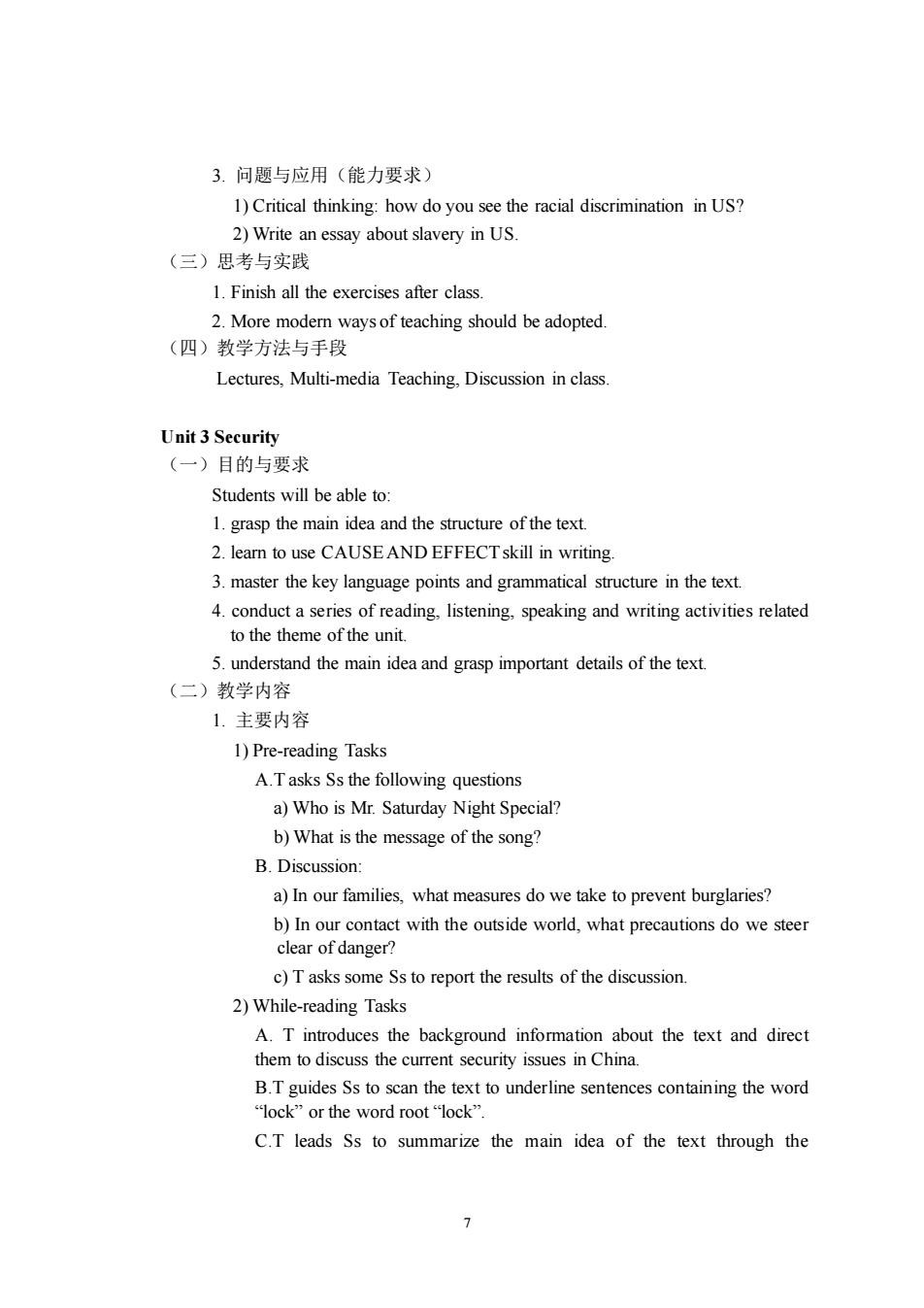
3.问题与应用(能力要求) 1)Critical thinking:how do you see the racial discrimination in US? 2)Write an essay about slavery in US. (三)思考与实践 1.Finish all the exercises after class 2.More modern ways of teaching should be adopted. (四)教学方法与手段 Lectures,Multi-media Teaching.Discussion in class Unit 3 Security (一)目的与要求 Students will be able to: 1.grasp the main idea and the structure of the text. 2.leamn to use CAUSEAND EFFECTskill in writing. 3.master the key language points and grammatical structure in the text 4.conduct a series of reading,listening,speaking and writing activities related to the theme of the unit 5.understand the main idea and grasp important details of the text (二)教学内容 1.主要内容 1)Pre-reading Tasks A.Tasks Ss the following questions a)Who is Mr.Saturday Night Special? b)What is the message of the song? B.Discussion: a)In our families,what measures do we take to prevent burglaries? b)In our contact with the outside world,what precautions do we steer cear of danger? c)T asks some Ss to report the results of the discussion. 2)While-reading Tasks A.T introduces the background information about the text and direct them to discuss the current security issues in China. B.T guides Ss to scan the text to underline sentences containing the word lock”or the word root"lock” C.T leads Ss to summarize the main idea of the text through the 7
7 3. 问题与应用(能力要求) 1) Critical thinking: how do you see the racial discrimination in US? 2) Write an essay about slavery in US. (三)思考与实践 1. Finish all the exercises after class. 2. More modern ways of teaching should be adopted. (四)教学方法与手段 Lectures, Multi-media Teaching, Discussion in class. Unit 3 Security (一)目的与要求 Students will be able to: 1. grasp the main idea and the structure of the text. 2. learn to use CAUSE AND EFFECT skill in writing. 3. master the key language points and grammatical structure in the text. 4. conduct a series of reading, listening, speaking and writing activities related to the theme of the unit. 5. understand the main idea and grasp important details of the text. (二)教学内容 1. 主要内容 1) Pre-reading Tasks A.T asks Ss the following questions a) Who is Mr. Saturday Night Special? b) What is the message of the song? B. Discussion: a) In our families, what measures do we take to prevent burglaries? b) In our contact with the outside world, what precautions do we steer clear of danger? c) T asks some Ss to report the results of the discussion. 2) While-reading Tasks A. T introduces the background information about the text and direct them to discuss the current security issues in China. B.T guides Ss to scan the text to underline sentences containing the word “lock” or the word root “lock”. C.T leads Ss to summarize the main idea of the text through the

organ☑ation. D.Texplains the language points and structure oftext A E.T explains the key words and the phrases. 3)Post-reading Task A.T Dictates some new words and expressions of text A to check whether Ss have grasped them. B.TChecks Ss'home reading(Text B)and explains important language points and difficult sentence structures. C.T guides Ss to use cause and effect in essay writing. 4)Speaking Task: Debating-Arguments for or against developing more security workers in downtown area 2.基本概念和知识点 1)Some basic concepts (Cultural background) A.Crime prevention B.Airport Security 2)Important language points Vulnerable;allege;ear;feature;transform;barrier;hold /keep(sb).at bay; with/without not so much as;with/by a small margin;reflection;outsmart oneself,look back on. 3)Grammatical structures It does not occur to.”,Chances are that.."“not uncommon'”double negative for emphasis 4)Understand difficult sentences: A.Indeed,a recent public-service advertisement by a large insurance company featuring not charts showing how much at risk we are,but a picture of a child's bicycle with the now usual padlock attached to it B.We are passing through these electronic friskers without so much as sideways glance;the machines,and what they stand for,have won. 3.问题与应用(能力要求) 1)T Guides Ss through some after-text exercises of Text A so that Ss can master the use of some key words and expressions and structures 2)Debating for holding guns or against holding guns in America A.Form teams B.Have a pre-debate discussion a)Prepare arguments and supporting facts by brainstorming together. 8
8 organization. D.T explains the language points and structure of text A. E.T explains the key words and the phrases. 3) Post-reading Task A. T Dictates some new words and expressions of text A to check whether Ss have grasped them. B. T Checks Ss’ home reading (Text B) and explains important language points and difficult sentence structures. C. T guides Ss to use cause and effect in essay writing. 4) Speaking Task: Debating-Arguments for or against developing more security workers in downtown area 2. 基本概念和知识点 1) Some basic concepts (Cultural background) A. Crime prevention B. Airport Security 2) Important language points Vulnerable; allege; ear; feature; transform; barrier; hold / keep (sb). at bay; with/without not so much as; with/by a small margin; reflection; outsmart oneself; look back on. 3) Grammatical structures: “It does not occur to...”, Chances are that...” “not uncommon” double negative for emphasis 4) Understand difficult sentences: A. Indeed, a recent public-service advertisement by a large insurance company featuring not charts showing how much at risk we are, but a picture of a child’s bicycle with the now usual padlock attached to it. B. We are passing through these electronic friskers without so much as sideways glance; the machines, and what they stand for, have won. 3. 问题与应用(能力要求) 1) T Guides Ss through some after-text exercises of Text A so that Ss can master the use of some key words and expressions and structures. 2) Debating for holding guns or against holding guns in America A. Form teams B. Have a pre-debate discussion a) Prepare arguments and supporting facts by brainstorming together

b)Carry out the debate structures that they can use in their debate.Tshould give general help to the students:especially the weaker ones and evaluate their performance after the debate (三)思考与实践 Take reflections on the topic of unit 3 and write an essay by using cause and effect writing technique (四)教学方法与手段 Lectures,Multi-media Teaching.Discussion in class Unit 4 Imagination and Creativity (一)目的与要求 Student will be able to: 1.grasp the main idea of Text A(Einstein was a child of his time). subheading.use of quotations.etc): 3.master the key language points and leam how to use them in context 4.understand the cultural background related to the content; 5.express themselves more freely on the theme of Imagination and Creativity after a series of theme-related reading,listening,speaking and writing activities. (一)数学内容 1.主要内容 1)Pre-reading Tasks A.Brainstorming:The whole class work together to name a dozen scientists of great intemational prestige and then list some of their achievements B.T asks Ss the following questions a)What is imagination? b)Why is imagination so important in scientific work? 2)While-reading Tasks A.Draw Ss'attention to the use of subheading in Text A,and then ask them to do Text Organization exercise 1.In this way Ss will get a better understanding of the text structure
9 b) Carry out the debate The debate begins between the two teams having contrary views. It will go on until one side fail to respond. T provides Ss with sentences and structures that they can use in their debate. T should give general help to the students; especially the weaker ones and evaluate their performance after the debate. (三)思考与实践 Take reflections on the topic of unit 3 and write an essay by using cause and effect writing technique. (四)教学方法与手段 Lectures, Multi-media Teaching, Discussion in class. Unit 4 Imagination and Creativity (一)目的与要求 Student will be able to: 1. grasp the main idea of Text A(Einstein was a child of his time); 2. appreciate the various technique employed by the writer(using a question as the title of the text, illustrating his answer with various supporting facts, use of subheading, use of quotations, etc); 3. master the key language points and learn how to use them in context. 4. understand the cultural background related to the content; 5. express themselves more freely on the theme of Imagination and Creativity after a series of theme-related reading, listening, speaking and writing activities. (二)教学内容 1. 主要内容 1) Pre-reading Tasks A. Brainstorming: The whole class work together to name a dozen scientists of great international prestige and then list some of their achievements. B. T asks Ss the following questions: a) What is imagination? b) Why is imagination so important in scientific work? 2) While-reading Tasks A. Draw Ss’ attention to the use of subheading in Text A, and then ask them to do Text Organization exercise 1. In this way Ss will get a better understanding of the text structure
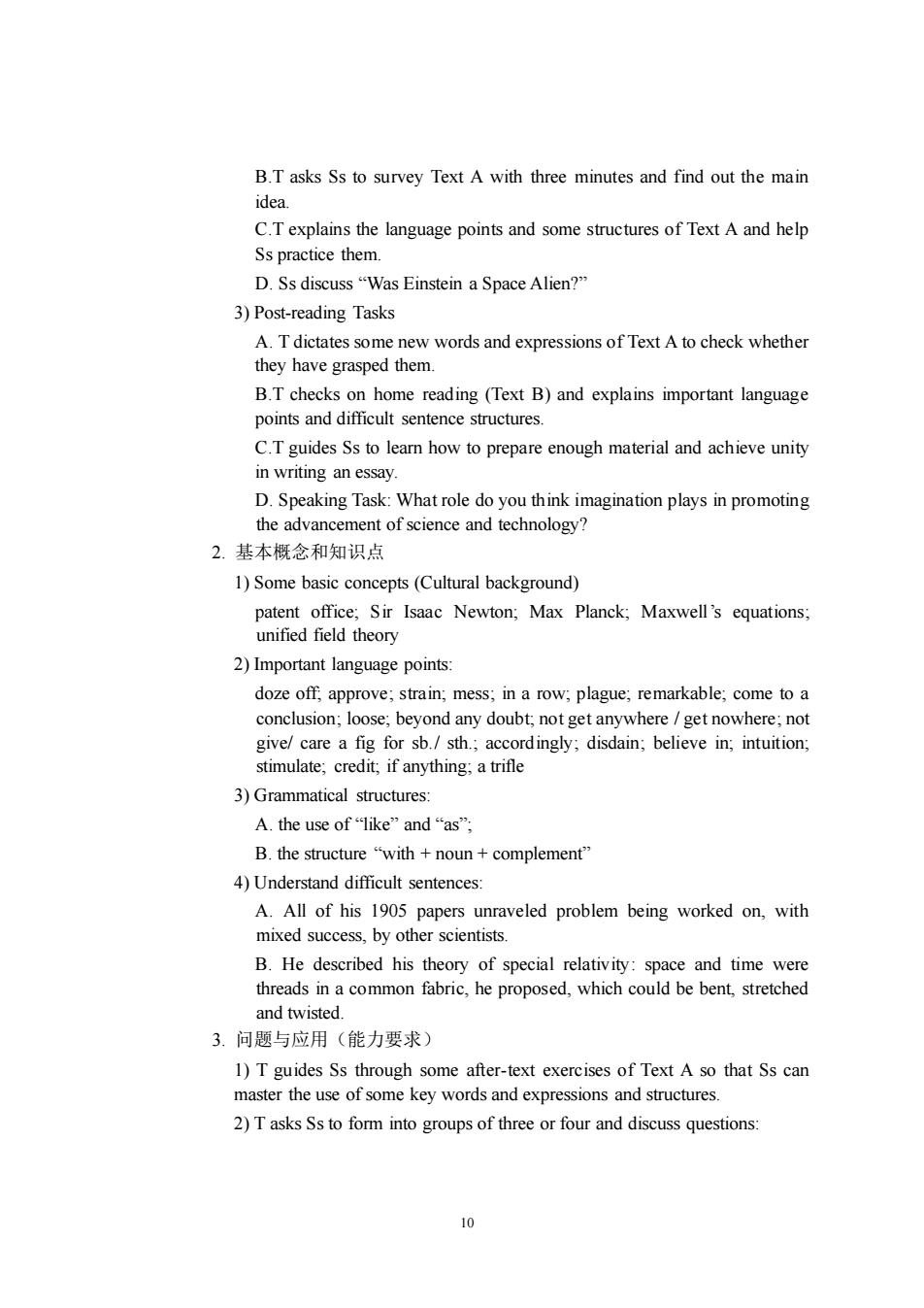
B.T asks Ss to survey Text A with three minutes and find out the main idea. C.T explains the language points and some structures of Text A and help Ss practice them. D.Ss discuss"Was Einstein a Space Alien?" 3)Post-reading Tasks A.Tdictates some new words and expressions of Text A to check whether they have grasped them. B.T checks on home reading (Text B)and explains important language points and difficult sentence structures C.T guides Ss to learn how to prepare enough material and achieve unity in writing an essay D.Speaking Task:What role do you think imagination plays in promoting the advancement of science and technology? 2.基本概念和知识点 1)Some basic concepts(Cultural background) patent office;Sir Isaac Newton;Max Planck;Maxwell's equations; unified field theory 2)Important language points: doze ff approve:strain;mess;in a row:plague;remarkable,come to a conclusion;loose;beyond any doubt,not get anywhere/get nowhere;not give/care a fig for sb./sth.;accordingly;disdain:believe in;intuition; stimulate;credit,if anything;a trifle 3)Grammatical structures: A.the use of"like'”and“as” B.the structure "with noun complement" 4)Understand difficult sentences A.All of his 1905 papers unraveled problem being worked on,with mixed success.by other scientists. B.He described his theory of special relativity:space and time were threads in a common fabric,he proposed,which could be bent,stretched and twisted. 3.问题与应用(能力要求 1Tguides s through some after-text exerises of Text As that Ss can master the use of some key words and expressions and structures. 2)Tasks Ss to form into groups of three or four and discuss questions: 10
10 B.T asks Ss to survey Text A with three minutes and find out the main idea. C.T explains the language points and some structures of Text A and help Ss practice them. D. Ss discuss “Was Einstein a Space Alien?” 3) Post-reading Tasks A. T dictates some new words and expressions of Text A to check whether they have grasped them. B.T checks on home reading (Text B) and explains important language points and difficult sentence structures. C.T guides Ss to learn how to prepare enough material and achieve unity in writing an essay. D. Speaking Task: What role do you think imagination plays in promoting the advancement of science and technology? 2. 基本概念和知识点 1) Some basic concepts (Cultural background) patent office; Sir Isaac Newton; Max Planck; Maxwell’s equations; unified field theory 2) Important language points: doze off; approve; strain; mess; in a row; plague; remarkable; come to a conclusion; loose; beyond any doubt; not get anywhere / get nowhere; not give/ care a fig for sb./ sth.; accordingly; disdain; believe in; intuition; stimulate; credit; if anything; a trifle 3) Grammatical structures: A. the use of “like” and “as”; B. the structure “with + noun + complement” 4) Understand difficult sentences: A. All of his 1905 papers unraveled problem being worked on, with mixed success, by other scientists. B. He described his theory of special relativity: space and time were threads in a common fabric, he proposed, which could be bent, stretched and twisted. 3. 问题与应用(能力要求) 1) T guides Ss through some after-text exercises of Text A so that Ss can master the use of some key words and expressions and structures. 2) T asks Ss to form into groups of three or four and discuss questions: